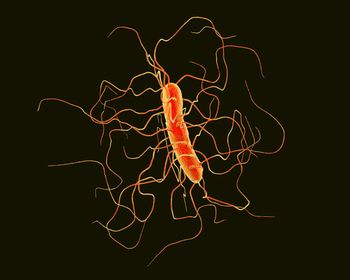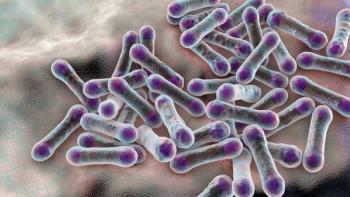
C. Difficile
Latest News

Patient Perspectives on Rectal Administration for Recurrent C difficile Infection

Reduced Vancomycin Susceptibility in C difficile Leads to Worse Patient Outcomes
Latest Videos

CME Content
More News

Andrew Skinner, MD, reviews challenges in managing CDI, as well as the treatment guidelines from IDSA, SHEA, and ACG.

A new study showed an introduction of beneficial microbiota.

Antifungal therapy was frequently initiated before essential diagnostic elements confirmed invasive fungal infections in critically ill COVID-19 patients.

Ferring’s Rebyota therapeutic was studied in this population and demonstrated a 79% efficacy.

Investigators in Canada found no evidence to support extending treatment for Clostridioides difficile infection for patients on concurrent antibiotics

Ferring’s Rebyota, which was FDA approved late last year, demonstrated a high efficacy and favorable safety profile in the prevention of recurrent Clostridioides difficile.

Joseph Reilly, BS, PharmD, BCGP; Candace Cotto, RN; and Andrew Skinner, MD, review C. difficile infection (CDI), its risk factors, symptoms, and quality of life for the patient.

Experts provide an overview of the gut microbiome and its importance to nutrition and overall health.

A novel oral microbial therapy under development by Vedanta Biosciences reduced the risk of recurrence of Clostridioides difficile infection in a phase 2 clinical trial.

The findings of this study could pave the way for new, disease-targeted probiotics.

Data from New Haven County, Connecticut, suggests the pandemic might have hurt efforts to curb recurrent CDI.

This was the first study to compare clinical outcomes in carbapenemase-producing (CP-CRE) and non–carbapenemase-producing (nCP-CRE) infections.

The floods, heat waves, droughts, and other calamities caused by excessive greenhouse gas emissions also make us more vulnerable to ill effects of pathogens such as bacteria, viruses, plants and fungi.

The Peggy Lillis Foundation will host its summit on Monday and has a number of speakers who will discuss topics related to this healthcare-associated infection (HAI).

While efforts to curb in-hospital infection seem to have paid off, community-acquired cases appear headed in the opposite direction.

Catch up with this week's 5 most-read infectious disease stories.

Reducing unnecessary antibiotic prescriptions for viral upper respiratory tract infections is crucial to stop the spread of antimicrobial resistance.

2 CDI recurrences occurred in this study, both in placebo recipients who were immunocompromised.

This study implemented an Electronic Health Record in a major hospital system to catch otherwise undetected C diff infections.

The epidemiology society worked with a few medical organizations to update the guidance to limit infections.

A study looking at 5 years of data showed a decrease in the amount of cases, but with some important trends to be aware of in this population.

This week's most-read stories discussed unforeseen consequences of the COVID-19 pandemic, including an increase in gastrointestinal diseases and a decrease in childhood asthma diagnoses.

Investigators reviewed the current literature on the utility of oral vancomycin prophylaxis (OVP), and offered guidance for when this approach may be beneficial.

A study demonstrated patients were frequently prescribed broad-spectrum antibiotics when more narrowly tailored antibiotics were considered the optimal choice.

Yesterday, the FDA took a major step toward officially approving Paxlovid. Catch up on this story and the other top COVID-19 news updates from the past week.







































































































































